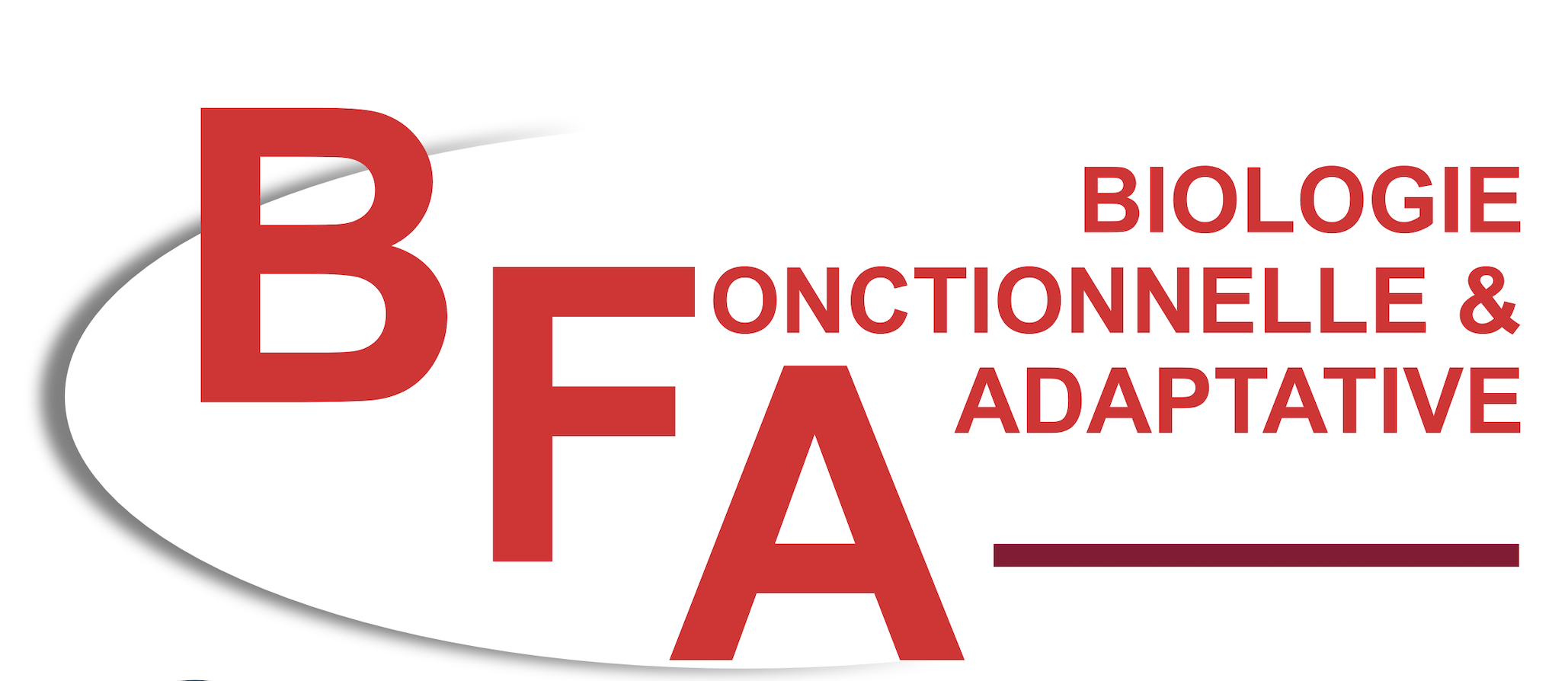Licences and masters
Several teaching and research staff from the Functional and Adaptive Biology Unit are responsible for teaching programs at Université Paris Cité, directly related to some of the Unit’s research themes.
- Life Sciences Bachelor’s degree (Nathalie Janel).
- Co-directors of the “Molecular and Cellular Biology” (Fernando Rodrigues Lima and Mireille Viguier), “Biology-Computing” (Anne-Claude Camproux) and “Integrative Biology and Physiology” (Jamileh Movassat and Sandrine Middendorp), “Neurosciences” (Giuseppe Gangarossa) master’s programs.
Direction/co-management of M1 courses: (Cécile Tourrel-Cuzin): M1 BIP - Co-direction of “Nutrition, Métabolisme énergétique, Signalisation” (Jamileh Movassat); “Biomolécules, Biologie et Pathologie Moléculaires” (Jean-Marie Dupret ; Fernando Rodrigues Lima), “In Silico Drug-Design – Modélisation des Macromolécules” (Anne-Claude Camproux; Olivier Taboureau), “In Silico Drug Design – Bioactive Molecules” (Anne-Claude Camproux; Olivier Taboureau), “Biologie-Informatique / Ingénierie de Plate-Forme en Biologie” (Delphine Flatters; Gautier Moroy), “Biologie du Vieillissement-BioVie” (Véronique Monnier). “Reproduction and Development” (David L’Hôte).
In addition, several teaching units (UE) are under the responsibility of the unit’s teacher-researchers.
Bachelor of Life Sciences
L1: Cellular and molecular biology; Cellular physiology; Molecular biology and genetics; Diversity and evolution of living organisms; Physics for biologists; Introduction to ecology; Introduction to bioinformatics; Scientific methodologies; Student engagement…
L2: Cellular and molecular biology; Integrative animal and plant biology; Biochemistry of biological macromolecules; Orientation tools and Voltaire training; Science and society…
L3: Cellular and molecular biology; Pathophysiology of major animal functions; New dietary trends; Cellular signaling; Metabolic physiology; Hormone receptors; Endocrine regulation; Reproductive physiology; Reproduction and wildlife; Cellular and functional differentiation; Molecular and genetic biology; Genetics of eukaryotes; Cellular and functional differentiation; Major functions and central nervous system; Cellular and integrative neurobiology; Animal ecophysiology; Developmental biology : tools and concepts; Enzymology; Ecotoxicology and environmental risks; Biostatistics; Bioinformatics; Omics; Molecular graphics; Biology and Society; Preparing for the Agro Véto entrance exam orals…
Master’s degree in Integrative Biology and Physiology
- M1: Pathophysiology of nutrition; Cellular physiology, Pharmacology of endocrine pathologies; Reproduction and development; Cellular dynamics; Systems physiology; Neurobiology of homeostasis; Integrative biology…
- M2: Signaling; Perinatal nutritional adaptations; Bioenergetics; Regulation of carbohydrate-lipid and protein metabolism; Pharmacology adapted to metabolic diseases; Brain and energy metabolism; Reproductive genetics and sexual differentiation; Reproductive endocrinology; Reproductive genetics and physiology; Biology of aging, Neurodegenerative diseases…
Master’s degree in molecular and cellular biology
- M1: Structure, transmission and expression of genomes; Cell biology; Biological reactions; Pharmacogenomics of xenobiotic metabolism enzymes; Enzymes: pathological processes and therapies; Structure and dynamics of biological macromolecules…
- M2: Molecular biology, macromolecules, pathologies and therapeutic approaches; Functional and pathological implications of proteins; Trends in Cellular and Molecular Biology…
Master’s degree in bioinformatics
- M1: Biostatistics and R programming; Mass data analysis; Artificial Intelligence; Optimization and Machine Learning Methods; Omics bioinformatics; Algorithms; Advanced programming; Protein-Protein Docking; Web programming; Biochemistry; Structural bioinformatics in toxicology; Introduction to In Silico Drug Design; Advanced simulation methods…
- M2: Data analysis and drug design; Structural exploration of proteins; Structural modeling and target dynamics; High-throughput screening applications; Toxicology and biotransformation; Python 2 programming; High-throughput screening: structure & ligand-based…
Master’s degree in Toxicology and Ecotoxicology
- M1: General and regulatory toxicology; Methodological approaches in analytical and cellular toxicology; Environmental xenobiotics and ecotoxicology; Predictive toxicology…
- M2: Mechanisms of toxic action; Basics of toxicology: study of mechanisms and methodological approaches; Cellular toxicology…
Master’s degree in Neuroscience
Master’s website: https://master-neuroscience-paris.fr/
M1: Homeostatic neuroregulations…
M2: Brain-body interactions in health and disease…
Courses outside Université Paris Cité
BFA staff also take part in training programs outside the Université Paris Cité:
- Sorbonne University: “Integrative Biology and Physiology” specialization.
- Université Paris-Saclay: “Biologie Santé” major; “Signalisation cellulaire, neurosciences” major.
- AgroSup/Université de Bourgogne Franche-Comté: “Nutrition and Food Science” major.
- University of Gdansk (Poland): “Biology” major.
- Université Saint-Joseph, Beirut (Lebanon): “Functional genomics and proteomics” major.
- Università degli studi di Milano, Milano (Italy): BI-In silico drug design (Franco-Italian double degree).
- Universities of Bar-Ilan (Israel), Ljubljana (Slovenia) and Nova de Lisboa (Portugal), Degli studi di Milano, Milano (Italy), Strasbourg: BI-In silico drug design (Erasmus mundus label consortium: EMJM Chemoinformatics).
